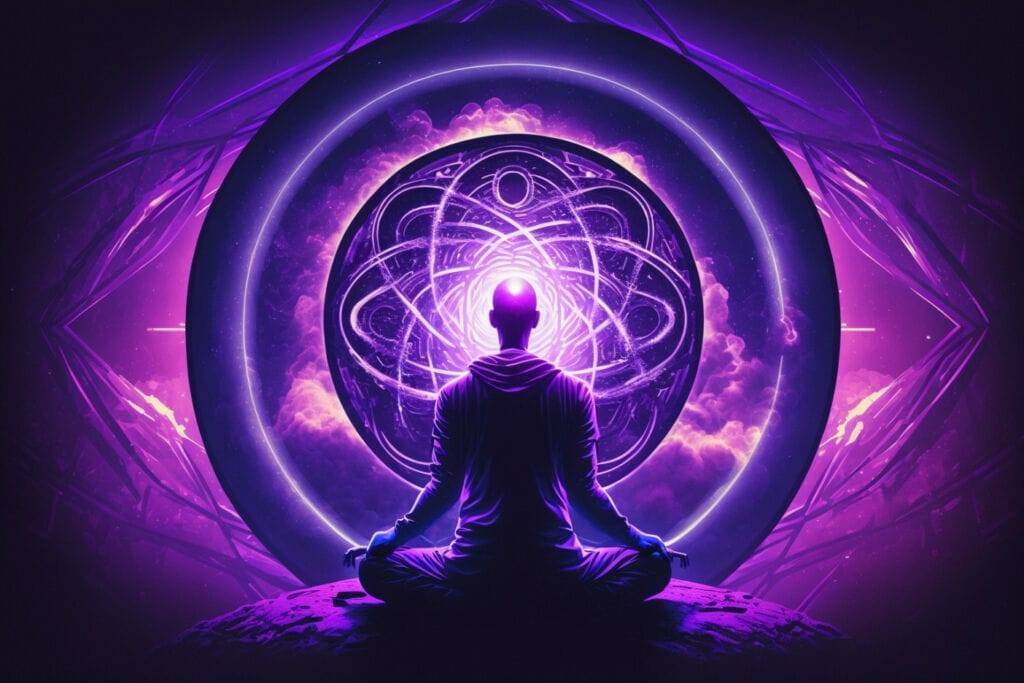There are five broad steps to reaching enlightenment.
The above may be a bold statement, but there may be no one person more qualified to express it than Dr. Andrew Newburg.
He is the director of research at Jefferson Myrna Brind Center of Integrative Medicine and is considered one of the world’s leading neuroresearchers.

From his studies, Newburg believes that each enlightenment experience is as unique as a fingerprint, but there’s a common thread that ties them all together.
Observing the patterns, Newburg distilled a basic five-step approach to help people become enlightened.
Step 1: The Desire to Change
“The first step we usually talk about is the desire to make this kind of change in your life. The desire to have enlightenment.
Now on one hand that may sound like a silly thing to say because why wouldn’t everybody want to have it? And to some degree that’s true.
I mean if you went up to anybody on the street and say hey, would you like to have the most incredible experience you could ever have? Change your life, change the way you think about the world and you’re happy for the rest of your life. I think most people would say yeah sure, that sounds great. Sign me up.
But the bottom line is that they are difficult experiences to get to. They’re certainly not impossible but they are difficult. And they are a little scary when you think about it because it’s rearranging the normal way you thought about the world up till now which for the most part has worked for you... So I think part of the whole process to start with is saying yes... I’d like to change.”
Exercises to Help:
“Take out a piece of paper and just sit at the table or sit at your desk. Take a few deep breaths, get yourself into a nice relaxed state and what we suggest is that you write down a couple of reasons why you would like to have an enlightenment experience.
Another related exercise is to sit down and write down what you think enlightenment means to you. What is it that you are thinking about? What is it that you would ultimately like to achieve through this type of process?”

Step 2: Prepare Your Body and Mind
“Not only do you have to desire it but you have to start to get ready to do the kinds of practices you may need to do. Get yourself ready for this kind of an experience.
Part of what we talk about in this context are relaxation techniques.
As you start to go down this path sometimes it can be scary, sometimes there’s a lot of different issues that come up for a person. It can raise a lot of problems for the person.
And so being prepared, being ready, thinking it through a little bit, trying to get yourself into a kind of mood that’s ready for this kind of an experience becomes very important."
Exercises to Help:
“Relaxation exercises - that can be as simple as just sitting there quietly and taking deep breaths over a period of several minutes to five minutes or so.
There are many different kinds of mantra-based meditation practices where you can start to focus on a particular image or a phrase that you can say over and over again...
Another very popular one is progressive muscle relaxation where you tense and then relax each of the muscle groups starting with the top of your head and your neck and your body and your arms, your legs and as you tighten them very intensely and then release them that starts to induce a greater and greater feeling of relaxation...
Again each person has to kind of come up with the ones that work best for them, that they like, that they feel good with. And this is part of that process of what prepares them for the experience of enlightenment.”

Step 3: Find a Ritual
“Now the third step is really the critical one in many ways and the one that people really have to think about what makes it kind of most unique for them.
And that has to do with a particular practice, rituals, the process itself that will lead them down that path.
Now this is where it does become highly individualized because some people may like to do prayer and some people may like to walk around. Some people may take drugs. Some people may do transcranial magnetic stimulation of the brain.
There are many different approaches that people can take but trying to find the one or ones that work best for you that is that individualized approach that will help to lead you down that path most effectively.”
Step 4: Surrender
“The fourth step is ultimately this kind of feeling of letting it all go. This feeling of surrendering to the experience itself.
To say that is simple. To actually let that happen in a profound way is not always the easiest thing for an individual.
Sometimes it has to be that you kind of keep challenging and revving and revving up the brain to such an extent that when you finally do say, ‘You know what? Okay, I’m just going to let this happen now.’
That’s what really just kind of pulls the rug out from under the whole process and that very sudden change in the way your brain goes through the whole process.
That feeling of surrender radically changes the way your brain works at that particular moment.
One of the areas of our brain that seems to be particularly involved in this whole process of the rituals and the feeling of surrender is our frontal lobe located behind the forehead.
And what we found is that during practices like meditation or prayer that frontal lobe activity gets ramped up to a very, very high level. But then when you have this feeling of surrender it drops down to a very low level.
In fact, since the frontal lobe is involved in helping us do purposeful things when we ultimately give our purposefulness over to the process that frontal lobe activity starts to decrease very substantially. And part of what we’re determining here is that it’s not just being high and being low. It’s the difference itself.
It’s the change from that peak to that very low level that really rearranges the way the brain works and sets up that very powerful experience.
If you think about flying in an airplane when you’re on the ground you don’t feel very much and when you’re up in the air you don’t feel very much even though you’re going 400 or 500 miles an hour. But it’s the takeoff or the landing where you really feel the change occurring. And that’s kind of what’s going on in the brain.”

Step 5: Reflection
“The last step is really what we talk about as reflecting on what this experience is for you.
It’s not just enough to have the experience but how you then incorporate it back into your thought processes, your beliefs, your experiences in the world, the ways in which you think about the world.
And being able to come back and reflect on that whether it’s just through thought processes or a practice like meditation is a critical element because it’s what ultimately brings that experience into your life and makes it real for you.
It makes it something that changes the way you think about the world for the rest of your life.”
The Effects of Enlightenment
The experience was overwhelmingly reported as positive.
“Ninety-five percent of people basically had something causative to say about this experience. And it inundated almost every aspect of their life.”
Those that have experienced enlightenment say their relationships have improved.
“They said yes [Enlightenment] did [improve their relationships] because they felt more compassionate, more love, more open with the people that they were interacting with.”

Enlightenment-experiencers felt a greater sense of meaning and purpose.
“When we asked them about their sense of meaning and purpose in life they all said yes, we have more, a great sense of meaning and purpose in life.
I know what I need to do. I know why we’re here. I understand it. I get it, you know. And now I know what I need to do in my life.
People report feeling better, healthier after enlightenment.
“They felt reductions in the stresses that they faced in their everyday life. They don’t think about stress the same way.
Obviously if you go down the path towards the Buddhist perspective of enlightenment the whole point of enlightenment is to end suffering. And to a large extent that’s borne out in the way people describe what these experiences do for them.
It reduces their sense of distress, their sense of anxiety, their sense of depression. It helps to improve all of those issues that people deal with and even their physical health they felt better overall.”
After enlightenment, people no longer feared death the same way.
“When we asked people about their fear of death people no longer feared death in the same way that we typically do.”
Via Big Think
2-3X Your
Learning Speed

A Simple Way to Mind Read
“When I wish to find out how wise, or how stupid, or how good, or how wicked is any one,

The World We “See” in Our Mind is Not the World Our Eyes and Brain Perceives
Have a look see at this chart used by neuroscientists Fuster, Crick and Koch to wrap your head around the

A Simple Way to 3X Your Chances of Reaching Your Goals
Like achieving stuff? Sure, you do. Wanna know a simple way to increase your chances by 300%? Psychologist Heidi Grant

The Science of Writing Yourself Into a Better Multiverse
Only just thinking about positive outcomes is pretty flimsy foundation for optimism and self-esteem. A strong foundation needs reinforcement. To


Well what is this "Enlightenment" and what does this term "surrender" mean – I have only vague ideas
Hi, Mark Waldman.
I would agree with 4 out of your 5 points. I don’t think that any ritual is a necessary for spiritual enlightenment, growth or development. Rituals tend to be habit-forming and habits, at least IMHO, are not any part of what any of the above ‘personal improvements’ are about.
But what would I know? I’m just a ‘pore, dumb bulldozer operator’ with only about 45 years of exploring spiritual growth and development. Hell, I’ve been studying at the University of Hard Knocks for close to 3/4 of a century and haven’t managed to graduate in anything yet. Then I discovered some years that you hafta ‘DIE’ to get outa that edu-ma-cay-shun institution and that the ‘graduation ceremony’ is more commonly called a funeral.
If you ever stop learning, you’re DEAD – – – at least from the neck up.
Just my 0.02.
You have a wonderful day. Best wishes. Deas Plant.